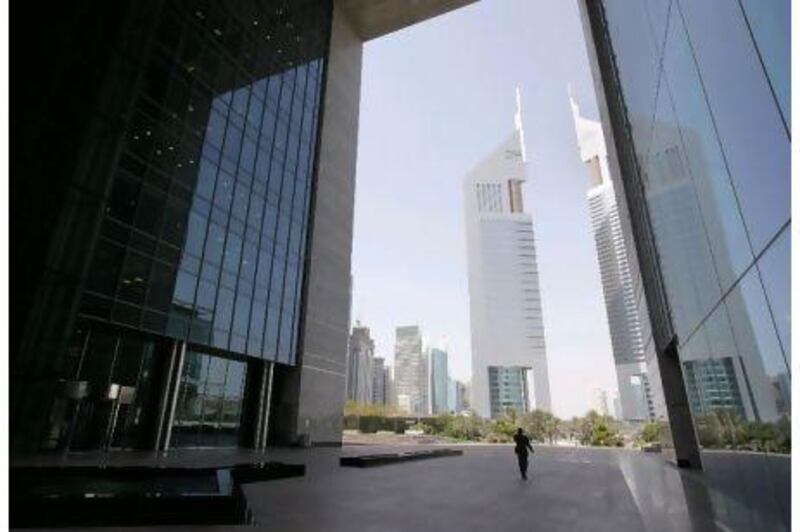Dubai has cut office rents in its central business district in a move that could encourage existing tenants to expand their presence in the emirate and also put greater pressure on commercial property prices.
The Dubai International Financial Centre (DIFC) revealed a new pricing "matrix" for its buildings that reduces rates from the start of next year by more than half from the peak prices at which leases were signed in 2008.
The rent reduction will have a much less dramatic impact on some companies, especially smaller entities occupying less than 5,000 square feet of space.
"Given the financial crisis and the global migration of staff from one centre to another, we need to make sure that the environment is comfortable for companies to plan their growth," said Abdulla al Awar, the chief executive of the DIFC Authority.
Rents will range from Dh160 (US$43.56) to Dh280 per square foot of office space, depending on the amount of space to be leased and its location among the DIFC's three main buildings.
A company that takes 20,000 sq ft or more in the premier Gate Building will pay Dh190 per sq ft, while less than 2,500 sq ft in the same building will cost Dh280 per sq ft. The prices will ultimately be increased by Dh50 per sq ft to cover maintenance costs and community fees charged by the DIFC.
The move comes as the DIFC enacts a new strategy to promote the centre as the ideal hub for international businesses serving the Middle East, Africa and south Asia.
While occupancy in DIFC's Gate Village, Gate Precinct and Gate Building remains at 95 per cent, Mr al Awar said the focus was to take a longer-term view on the centre as a driver of economic growth.
Analysts said yesterday the impact of the new pricing structure for the DIFC would be broadly positive for the market as it would reduce costs for some companies and set a new benchmark for top-end office space.
More than 2 million sq ft of new space is expected to be available in the 110-acre DIFC zone as a whole in the next 18 to 24 months. Rents in those buildings are likely to be aligned with DIFC's own offices.
"I think generally it's fantastic news for some tenants in the DIFC who are paying high rates," said Robin Pugh, the head of tenant representation at the consultancy Jones Lang LaSalle. "Some tenants were said to have been paying as much as Dh600 a sq ft and others were certainly paying more than the announced rates."
The DIFC also announced reduced parking fees, to Dh1,000 per month for unreserved spaces and Dh2,500 per month for reserved spaces, as well as reduced overall fees for operating in the centre.
Smaller companies will see the least benefits from the new parking prices. Kaashif Basit, a partner at the law firm KBH Kaanuun, said the reduction was less than he had expected. His company occupies less than 5,000 sq ft in the Gate Village, meaning the price would drop from his current lease of Dh300 per sq ft to Dh275 including maintenance and community fees.
Murray Strang, a senior valuations surveyor at the property consultancy Cluttons, said the new rents were designed primarily to encourage existing tenants to expand.
"We've seen rents come down that much anyway across Dubai," he said. "The structure is more geared towards expansion of current tenants and expansion of business than drawing in new tenants."
The wider impact, Mr Strang said, would be on the commercial property market as a whole. Any clear communication on leasing rates will be used as a guide for other high-end property and could push down other rents in the wider DIFC zone.
"A lot of other rates, prices and values are set against the DIFC rates because they are publicly announced and a good standard with the quality of the tenants they've got in there," he said. "We might see more realistic levels of landlords reducing asking prices across the market, especially in free zones."






